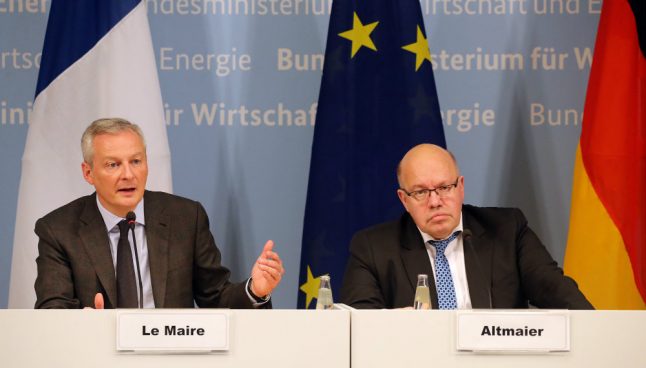The dispute has simmered since the 2008 global financial crisis but French Finance Minister Bruno Le Maire warned Friday that widening differences over economic policy among eurozone countries could undermine the currency union itself.
“Growing economic divisions among member states are unsustainable in the long term and could result in the disappearance of the common currency project,” Le Maire told reporters on the sidelines of the International Monetary Fund and World Bank Spring meetings.
“Countries with solid budgets must invest more,” Le Maire said. “Those with the means shouldn't hoard money for years and years, allowing growth to deteriorate.”
That was the same message pushed by the IMF itself, which on Friday again urged Germany to boost spending in order to accelerate growth and raise wages while reducing its budget and trade surpluses.
“We continue to see a case for eurozone countries that have fiscal space, like Germany, to increase spending or cut taxes to help boost potential growth,” Poul Thomsen, head of the IMF European Department, told reporters.
He highlighted Germany's very large budget and trade surpluses, which traditionally would have caused the national currency to strengthen, something that is no longer possible given the common currency in the eurozone.
That means that even with low unemployment wages are rising very slowly, Thomsen said.
While he acknowledged that Germany's spending increase in 2019 amounts to 0.7 percent of the economy, which he called “notable,” he said “we need to see more and keep it coming.”
Amid a “pronounced and worrisome” global economic slowdown, Le Maire called for a European “growth pact” which would include increased spending by economies with the “fiscal space” to do so, an allusion to Germany and the Netherlands.
Those governments should “invest in new projects, innovation, so that there can be more cooperation and solidarity in the eurozone.”
German Finance Minister Olaf Scholz rejected the criticism and denied his country was not doing enough to stimulate its economy.
“We have a very expansive investment strategy,” he said at a separate media briefing.
And Berlin is increasing public investment in infrastructure, education and the digital economy.
“We did already what everybody is asking us.”
Le Maire said countries like France also should pursue economic reforms and shore up their finances, something Paris is “determined” to do with measures “that get results.”
The country is “clear-eyed about France's economic weaknesses,” he said, adding, “I hope that every euro area member will have the same wisdom and clarity. If not, there can be no common future.”
READ ALSO: Germany sees biggest consumer spending growth in 24 years



 Please whitelist us to continue reading.
Please whitelist us to continue reading.
Member comments